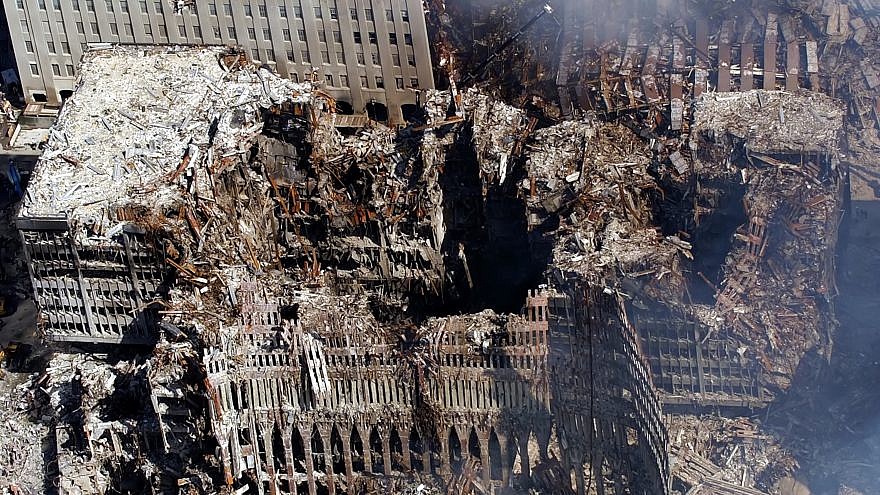On the 18th anniversary of the Sept. 11, 2001 attacks, government officials and institutions throughout America commemorated the horror of that day. But after all these years, there is a sense that—other than for those who lost family members or close friends—the ceremonies are increasingly becoming more a matter of going through the motions than of national grief.
Much like the way the memory of the Japanese attack on Pearl Harbor on Dec. 7, 1941—a comparable tragedy that altered the life of the nation—became routine and then ultimately a footnote as the decades passed, 9/11 is becoming a moment frozen in the past and not a reminder of the dangerous world in which we still live.
That this is true is probably as much a product of human nature as it is of the failure of our leaders in the post-9/11 world. But it’s worth pointing out that this same process hasn’t been repeated in Israel as time has passed since the end of the Second Intifada that brought similar widespread horror to its victims. As a prescient op-ed published in The New York Times by Matti Friedman noted, the memory of the slaughter hangs over Israeli society and is still a decisive factor in their politics.
There are profound differences between 9/11 and the intifada. 9/11 was one day that thankfully was never repeated again on American soil (a point that seemed to earn President George W. Bush no credit with the public even though most of us assumed that it would be). By contrast, what happened to Israelis was several years of a terrorist war of attrition involving hundreds of attacks, including suicide-bombings that struck throughout the country rather than being concentrated in just a couple of places.
The overwhelming majority of Israelis were not just traumatized by the experience, but also forced to accept that faith in policies rooted in territorial compromise and trust in Palestinian intentions were mistaken. The consciousness that the attacks were made possible, if not inevitable, by an attempt to make peace in the form of the Oslo Accords in which most Israelis had at one time had faith made the intifada all the more bitter.
Some on the left think Israelis are wrongly obsessed with this period and fail to recognize that the threat of terror has abated in many respects. But most in the country rightly understand that even with the construction of a security barrier in the West Bank and Jerusalem, checkpoints that monitor the ability of terrorists to operate and Iron Dome batteries that shoot down terrorist rockets, their security is not something they can or should take for granted as long as Hamas and the Palestinian Authority, which perpetrated the spate of terror attacks, remain in power.
That is why, despite all the baggage that comes with 10 consecutive years in office, Prime Minister Benjamin Netanyahu continues to hold onto the loyalty of so many voters. While his detractors mock his claim to be “Mr. Security,” the public understands that he has managed the singular skill of keeping terrorism in check while being cautious about the use of force. While many Americans disparage him for not having the “courage” to take risks for a peace that Palestinians don’t even seem to want, Israelis comprehend that his job is first and foremost to keep them safe—not to impress foreign critics.
By contrast, the memory of 9/11 plays little role in determining U.S. foreign or security policies.
Part of that has to do with weariness about the way the wars in Iraq and Afghanistan dragged on, as well as the fact that many, if not most of us—a category that apparently includes the president of the United States—seem to think the use of American force against the 9/11 perpetrators and their allies like the Taliban, in addition to other threats to international peace like Saddam Hussein, was a mistake.
More Americans seem to be convinced that fighting Islamist terrorists is folly than those who counsel vigilance or voice fears about the revival of groups like ISIS and the danger from regimes like Iran. In the eyes of some, the great sin of 9/11 was the danger that it might lead some to express prejudice against innocent Muslims, even if the idea of a post-9/11 backlash is more myth than fact.
What else can explain the lack of general outrage about the notion of making peace with the Taliban—the allies and hosts of Osama bin Laden—except a Sept. 10 mentality that wishes to extricate the United States from the Middle East at all costs?
President Donald Trump committed U.S. forces to fight and defeat ISIS—a successor group to Al-Qaeda whose rise was enabled by President Barack Obama’s withdrawal from Iraq. But he now seems more interested in cutting and running from Afghanistan and Syria than in continuing that fight. He may also now be considering stepping back efforts to quarantine the world’s leading state sponsor of terror: Iran. Democrats criticize Trump for the way he carries out these policies, though have no issue with their substance.
This means that as far as determining U.S. policy is concerned, the memory of 9/11 is rapidly becoming no more significant than Pearl Harbor.
While Americans have chosen to ignore the importance of the ongoing terror threat to their security, Israelis don’t have that luxury. Those who wonder about the outcome of Israeli elections or Netanyahu’s enduring popularity should look to the way that country thinks about its version of 9/11 as an explanation.

























